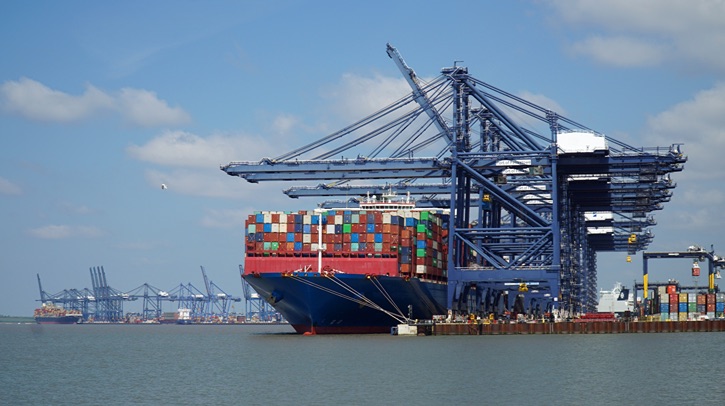Mike Kane, the UK Maritime Minister, has announced £30m (US$40m) funding to decarbonize shipping and power up the local economies of the UK’s coastal communities, during his visit to Clydeport in Glasgow.
Awarded from the sixth round of the Clean Maritime Demonstration Competition (CMDC), the chosen companies have been given a share of funding to support the development of clean maritime fuels and technologies such as ammonia, hydrogen, methanol, solar and electric.
Kane said, “It’s so exciting to see investment in green fuels and technologies spurring on skills, innovation and manufacturing across the UK, delivering on our Plan for Change missions to kickstart economic growth and become a clean energy superpower. We’ve charted a course to net zero shipping by 2050 and this £30m [US$40m] will be crucial in supporting the green fuels and technologies of the future, so we can clean up sea travel and trade.”
Clydeport visit
During his visit to Clydeport, the minister met with workers from the National Manufacturing Institute Scotland, which is looking to help Smart Green Shipping scale up the manufacturing of the FastRig windsail. Built nearby in Glasgow, the FastRig is a high-tech wing sail that can be installed on vessels, reducing fuel use and emissions by up to 40% per annum. The project received £3.3m (US$4.4m) from the third round of the CMDC and has now been deployed at sea.
Chris Courtney, CEO of National Manufacturing Institute Scotland, added, “Clean maritime is a vital part of a wider mission to decarbonize transport. Advanced manufacturing is critical to enable companies to scale up novel solutions that deliver emissions reductions and allow the creation of new jobs in these industries of the future. We’ve spent the past two years working on the CMDC-funded MariLight projects, led by Glasgow-based Malin Marine Consultants, part of the Malin Group, supported by industry partners, where we demonstrated how advanced manufacturing can cut lead times, lower carbon and enable localized production in shipbuilding. It’s great to see continued momentum through the program, and we look forward to supporting Smart Green Shipping’s journey as it scales.”
The minister also met with Peel Ports and local workers at Clydeport’s King George V Docks. Clydeport reportedly delivers £3m (US$4m) of investment to Glasgow’s shipbuilding heritage by supporting the growing demand for handling huge wind turbine components for the renewable energy sector.
Jim McSporran, port director at Peel Ports Clydeport, stated, “We’re proud to welcome the Maritime Minister to Peel Ports Clydeport today and showcase how our facilities continue to create opportunities for investment, jobs and skills that will benefit the people and businesses of Scotland. Our recent £3m [US$4m] investment in road infrastructure at King George V Dock to accommodate growing demand for handling wind turbine components, and our ongoing transformative work at Hunterston PARC in Ayrshire to support the renewables sector, demonstrate our commitment to decarbonizing supply chains and enabling the transition to a greener economy. It’s fantastic to see government and industry working together to back innovation, and today’s visit reinforces how Glasgow’s maritime legacy is helping to drive the UK’s clean energy future.
Diane Gilpin, CEO of Smart Green Shipping (SGS), said, “CMDC3 support enabled SGS, a Scottish-based business, to demonstrate the safety and robustness of FastRig, our Clyde-built wingsails, and to build out our digital decision-making platform, FastReach, which underpins our unique wind-as-a-service proposition. Over the last three years, SGS has invested £7.6m [US$10.2m] in R&D, 60% of that in Scotland. We’ve drawn upon engineering design skills in adjacent sectors like renewables and oil and gas, and digital expertise created in Scotland’s tech community. We are also working alongside the National Manufacturing Institute of Scotland to design circular manufacturing solutions to reduce embedded emissions and minimize use of precious materials while creating good green jobs as part of a sustainable just transition.”
Mike Biddle, executive director of net zero at Innovate UK, concluded, “Congratulations to the awarded projects from round six of the CMDC – a great opportunity for UK innovators to take part in a world-renowned maritime transport R&D grant funding program. Innovate UK looks forward to working with partners to support these projects focused on the ever-more-prevalent issue of decarbonization with emphasis on a range of physical, digital, system and skills-based innovation.”
UK SHORE funding
So far, CMDC has provided over £136m (US$183m) funding to 142 organizations as part of the wider UK SHORE funding – the government’s program dedicated to decarbonizing maritime – for over 300 organizations, including 250 SMEs. Projects include the installation of electric chargepoint networks across ports, including at Aberdeen, the demonstration of an electric crew transfer vessel at Aberdeen Offshore Wind Farm, and the demonstration of a green hydrogen shore power system at the port of Leith.
Building on its commitment to clean up shipping and deliver on the UK’s climate ambitions, UK SHORE is also delivering £3.85m (US$5.17m) to the Clean Maritime Research Hub. Formed from a consortium of 13 universities across the UK, dedicated to conducting scientific research in clean maritime, the funding will enable the hub to continue its important research, and support the installation of a liquid hydrogen facility at Durham University. The center will develop the maritime sector’s understanding of the potential impact of liquid hydrogen – which is emission free – in the clean maritime transition.
In related news, in collaboration with partners LCP Delta, Marine Zero, ev.energy and the Port of London Authority, UK Power Networks is looking to expand the Electric Thames project beyond London to the UK’s whole maritime sector



